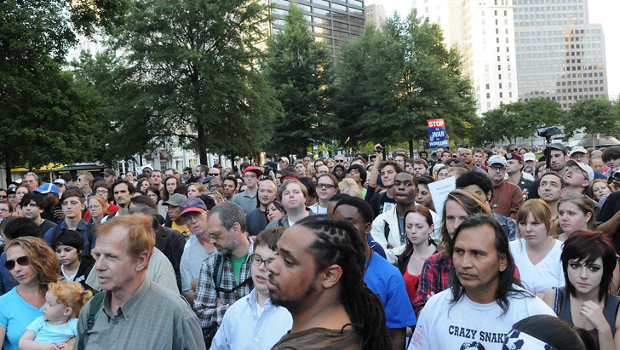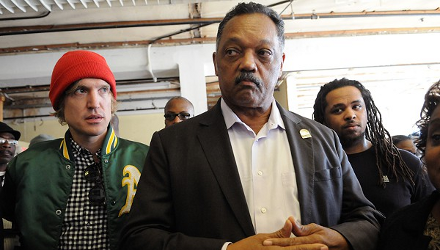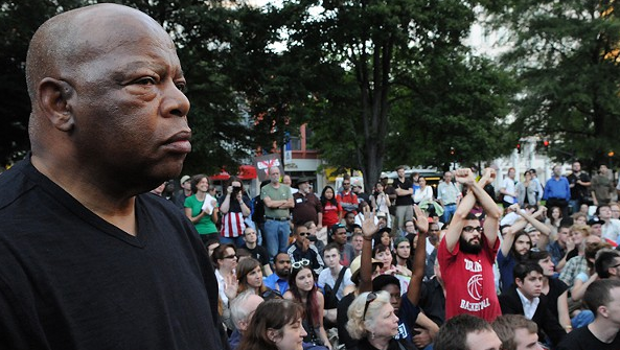The Occupy Atlanta (OA) movement, like the OWS movement more generally, revealed a national response to the general economic crisis. Many imagine the economic crisis forced up a spontaneous gathering of forces of a new generation. In Atlanta, that new gathering really only lasted for a few days and became alienated and dispersed while the occupation lasted weeks. Far more than we realize the occupation was a product of established “progressive” organizations and calcified ideas which have been an obstacle to a new liberation struggle for decades now. Still, as dedicated activists and new community organizers began to mobilize themselves, the contradictions between what they claimed to be fighting for, and their actual perspectives, tactics, and political program became clear.
Of course, no mass movement is ever distinguished by one set of ideas. But if participants are genuinely radical minded and asking questions in an attempt to get to the root of society’s dilemmas, they are often transformed by their experiences. While most participants are not philosophers or historians and may not know specifically what they want to achieve, those in movement often strive to liberate themselves as they confront institutions and the obstacles they place in their own path—such as skepticism that ordinary people can directly govern themselves without hierarchical leaders. Very often they discard one idea or leader for another in an attempt to overcome partial awareness and mistaken choices. It will, of course, be a truly new beginning when working and oppressed people arrive on their own authority, confident in their capacity to emancipate themselves and directly govern.
The Occupy Atlanta movement exhibited great potential to support a vision of popular self-emancipation. Yet, at no time did the self-appointed official spokespeople of OA advocate politics consistent with this goal. There has been some confusion about this because of the way the initiators of the OWS movement have portrayed the movement itself and how the corporate media has generally perceived its public emergence.
In the OA movement, the Quakers/American Friends Service Committee was in the driver’s seat from the beginning. Secondarily, Jobs with Justice (in Atlanta the Teamsters are central, not SEIU) emerged as a major force. Both defined getting Big Business out of politics consistently in a manner that declares the Republicans as the enemy and lets the Democrats (and their capitalist patrons) off the hook. This is the current standard in the “progressive” approach to community organizing. Nevertheless, as the movement evolved locally and nationally the potential of the OWS movement began to be clarified.
Unfortunately, but not unexpectedly, OA never held truly popular assemblies as they claimed, nor did they live up to their claims to support a direct democracy. In the first few gatherings a popular audience from Atlanta did show up. Yet, what was organized in Woodruff Park when the largest crowds came out was a type of crowd politics where the organizers monopolized asking rhetorical questions and projecting these on to an uninitiated crowd. The only decisions that were made in these interactions regarded on what terms activists were to practice civil disobedience in the event the police attempted to dislodge the activists from the park.
From the very beginning, there was a program or platform which the leaders were guided or animated by—which was never made transparent to the uninitiated. This was called the 99% Declaration. There was never anything like a real Popular Assembly facilitated where these set of politics, or another program or demands, were raised to be voted up or down. Instead, the only discussions that were held in the park were of an affinity group nature—was civil disobedience desirable and on what terms? The goal of the 99% Declaration is to have a national convention of delegates which passes a program of transitional demands palatable to, but slightly to the left of, Obama, such as healthcare by a single payer system and restoration of Glass-Steagall—laws which assume the capitalist state can regulate Big Business. Thus, there was discontent from the very beginning by the most advanced and sincere radicals who participated in the gatherings—and whose identities were hijacked by the most prominent organizers. The media portrayed the OWS movement as a “leaderless” force of “anarchy”—yet, all who stood for these principles began on the outside looking in and stayed there.
Under the premise of Quaker civility and non-violence (with none of the better instincts of someone like Staughton Lynd), there has been a type of harassment of anarchist and Marxist sentiment within the coalition. Some of the Teamsters/JWJ people felt threatened by the Georgia Federation for Direct Democracy’s From Popular Assemblies to Provisional Government document, claiming it was “ultra-left” and that whatever valid ideas the document raised were too “ahead of their time” to be seriously considered, much less implemented. The document advocated direct democracy and workers’ self-management in workplaces, schools and neighborhoods by popular councils and assemblies and called for a break with the “Old Politics” of both the Democratic and Republican parties. But after the Oakland events, the bureaucratic Maoists and Trotskyists within the Teamsters staff started talking more left and suggested they were for workers’ control of production.
As with other cities, naive but well meaning young people began to be beaten out of the Democratic Party by the Democratic mayors and their police—many on the internet discussion list say things like “I have lost all respect for Mayor Kasim Reid.” The widely unseen reality is that the Quakers and Teamsters/JWJ, who cast themselves as primary organizers of OA, were the ones who got the vote out for Mayor Reid’s election in the first place. Notably, at one early gathering in Woodruff Park, the major Teamsters/JWJ leader was on the phone directly with the Mayor and the Quaker leader (OA’s public face, Tim Franzen) held his own private consultations with the Mayor (on the street in the Mayor’s police trailer) before the Mayor’s police finally removed the protestors from the park weeks later.
There were, in fact, many instances within OA where anarchists, Wobblies, and other radicals assumed roles of organizers and facilitators in the park, but these individuals most often decided to focus their efforts on “housekeeping” type activities and failed to openly challenge the liberal element that was present. Either in fear of losing the popularity contest to their more organized liberal opponents, or mesmerized by the mere presence of a seemingly direct democratic “consensus process” for decision making, these sincere radicals often allowed themselves and their ideas to be steamrolled in the name of process. Too often, these individuals seemed to believe that maintaining a movement for direct democracy was somehow synonymous with adhering to the wishes of the liberal majority within OA. After the first few nights, there was relatively little mass audience. The park was now perennially occupied by conscious and motivated activists. This is the context which allowed for the in-depth debate to move away from the “assembly” where it belonged, and be relegated into the realm of the internet.
Sadly, the Facebook discussion quickly became the venue where the real political discussions took place. In these message boards, those who adhered to the most consistent direct democratic and anti-capitalist politics were smeared by activists who ran the listserv, who themselves had no politics independent of Obama and the Democrats. But from the time of the first park occupation, some assorted Wobblies, anarchists, and some African-American socialists maintained devastating criticism on these Facebook discussion lists. There are some better politics waiting to break out.
Many radical activists who were present at OA may suggest that forming a “Radical Caucus” was a symbolic break with liberal factions like JWJ, the Teamsters and the Quakers. Unfortunately this break was only symbolic. While many radicals were sincere in their opposition the liberal politics of these groups, the failure of the sincere radicals in this Caucus to put forward a coherent political agenda based on direct democracy and workers’ self-management implicates the ineffectiveness of this “break.” Even within the internet discussions, radical activists often allowed themselves to be baited by certain liberal organizers and trade union bureaucrats into arguments concerned merely with the appropriateness of the Radical Caucus holding anti-police demonstrations. Such debates arose as the liberal element clearly sought to lay blame in advance on OA’s radicals for the inevitable police disruption. Under such terms of discussion, sincere radical activists saw their radicalism become overly focused on psychologically antagonizing liberals instead of promoting a set of new politics which would speak to working and oppressed people’s potential for self-emancipation. It should not be assumed that this tactical manipulation of sincerely radical activists by liberal and trade union organizers was accidental. It wasn’t.
From the very beginning, with the controversy on the first day of whether John Lewis (owned by Coca Cola and American Express) should be able to speak, until the relative end when the Mayor sent the SCLC elders, like Joseph Lowery (owned by Coca Cola and Georgia Power), as emissaries, the Occupy Atlanta movement has been overwhelmingly white but not completely white. There were African-American lesbian women among the Quaker contingent. There were African Americans and Latinos among the Jobs with Justice contingent. There were people of color revolutionary socialists critiquing both of these groups. So, if people of color were present among all ideological tendencies, how did the Occupy Movement get bogged down by discussions of white privilege when no major grouping or specific politics was finally condemned for such a stance?
Interestingly, the Teamsters/JWJ grouping on the first couple of nights was on the outside of the OA leadership critiquing the Quakers/AFSC for behaving in a white privileged fashion. Both groups were multi-racial and both groups were weighed down by white privilege ideology. But the Quakers initially allowed white males to disproportionately speak to a sizable people of color audience the first night. The Teamsters/JWJ wished to see more women and people of color speak. But when each grouping spoke, they did so from a liberal, American Exceptionalist perspective. Neither group condemned the President or Mayor who were people of color Democrats. No local demands were made on the Black led city government. Soon the Teamsters/JWJ and the Quakers/AFSC were on the same page. Perhaps the Mayor’s office helped them get it together.
The White Privilege/Guilt politics was used from the very beginning to extend the legitimacy of Obama and the Mayor and the Black Democrats who lead the city. Often a Jim Crow context was used to explain inequality in the city which was simply false and a-historical. There were no attacks on Coca Cola—despite the fact we were in Woodruff Park and they are the major patrons of the Democratic Party. While protesters renamed this Woodruff Park “Troy Davis Park”—there are many parks and buildings all over the city named for Robert Woodruff—the founder of Coca Cola. There was no comment on the tall school of policy studies which shadows the park named for Andrew Young, associate of Dr. King and former Mayor and representative to the UN under President Carter.
If one lives in the city of Atlanta and deals with an HR department in a workplace or gets a bank loan, Black women are in charge almost everywhere. If you lose your job or get foreclosed on, and have women of color and men of color police standby, during that whole experience one almost never sees white men. Majority people of color cops arrested the OA activists. Some suggested people of color were disproportionately affected by unemployment which is true. But this is misleading when nobody expressed in Atlanta that they were also disproportionately represented among management, politicians and police. Under such conditions concerns with white privilege were irrelevant and did not speak to the power structure in Atlanta. This is what equality looks like under capitalism in an overwhelmingly Black multi-racial community. None of the critics of white privilege were opposed to capitalism—at least not the capitalists and their managers in this city.
There has been some discussion of the pros and cons of brokering some alliance with the right-wing Tea Party movement, at its best perhaps as embodied by Ron Paul. But rightfully, the OA at no point wished to unite with racists and homophobes. But they also don’t realize how objectionable it is that they see themselves in many ways as equivalent to the Tea Party in pushing the Democrats from behind like the former appear on some level to do for the Republicans. The reality is Occupy and Tea Party are both funded by capitalist interests and endorsed by celebrities who don’t wish to break with the establishment.
At some point, the anarchists, Wobblies and Marxists (who are not for a Popular Front with the Mayor and the President) have to break with the Quaker and JWJ people. An alternative program based on workplace and neighborhood councils and assemblies as the direct location of government, condemning both the Democrats and Republicans, is what is needed. The dilemma is that while the corporate media led by CNN is willing to speculate on an ambiguous Occupy movement and the Fox news types would slander the most mediocre liberal as a communist, the moment to raise a competing program will only happen once. There is currently a race to see who will define this movement before the Obama electoral campaign gets into full swing—and hypocritically campaigns against corporate privilege as he is sponsored by Wall Street. This is because the national assembly of the Occupy movement will not propose direct democracy and workers’ self-management as a basis for a dual power or alternative direct democratic government.
The greatest outrage of this whole experience is that, while the Left of Occupy Atlanta has struggled to cohere itself organizationally (even as they win the real debates internally and online), there has been an appeal by the moderates to mobilize the Atlanta community around politics that they already support (without the OA)—support for Obama and the Black Democrats. Why fight with the police and sleep in the park for that?! They don’t understand that you don’t get the loyalty of the masses by telling them what they already know at their most conservative. The OA spokespeople never made a press statement asking people in their workplaces and neighborhoods to take matters into their own hands where they labored and lived. Instead, it acted as if a growing occupation of a park which did not oppose the city government and its patrons was going to overturn Big Business.
The Oakland events, especially the turn to the Port and dockworkers (however few as a result of containerization) we think pointed the way forward. But what we are fighting in Atlanta is not fear of Jim Crow police but the inability to confront soundly the Black police and Black corporate political establishment. We think the kind of resentment and tension that the movement in Atlanta stirred up at its height (again, one can see this by following the Facebook page) was wasted because it was perceived that the Occupy movement represented something which in fact it never did, a break with official society. Middle class people of color snickered at what they saw as dirty naive white people who in fact had the same exact politics as they did more or less.
We might conclude by reflecting on the initial debate over whether Congressman John Lewis should have been allowed to speak or not. He was not blocked from speaking because he was an ally of Big Business. He was blocked from speaking as a result of a dispute over whether he should have been privileged to jump the stack of future speakers which had been waiting. Many believed Lewis represented the radical tradition in the city of Atlanta. Lewis has been in Congress since the early 1970s and was famously attacked by white supremacist police at the Edmund Pettis Bridge in Alabama in the early 1960s. He was not the last to be assaulted by police fighting for freedom. And he cannot be permanently held in esteem for past service. There is nothing that distinguished him as a leader of the post–civil rights era. In fact, he represents the betrayal of a direct democratic conception of Black Power where the working people and unemployed should hold the reins of the city. The fact that the majority of activists, whites and people of color, still believe they are fighting a white power structure belies the reality that, two years ago at the Civil Rights Exhibit at the High Museum, John Lewis’s fine words about freedom were prominently brought to the audience by American Express. Until the Occupy movement discards outmoded ideas of power and authority, it will not be able to fulfill its mission of getting Big Business out of politics.


